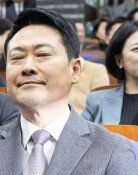Rice Talk Hearings
The Special Committee on the Investigation of Rice Talks held a National Assembly hearing attended by 36 witnesses and references on June 13 to investigate diverse allegations including the issue of whether there is a behind-the-scene agreement on the rice talks.
The committee members pressed those in charge of the negotiations hard by saying, The government has concealed that it entered into a behind-the-scenes agreement due to the absence of negotiation skills. However, the witnesses from the government offices insisted, That was not a behind-the-scenes agreement, it was an accessory agreement. But they acknowledged that they had failed to let farmers participate in the negotiation process.
Behind-The-Scenes Agreement or Accessory Agreement?
The most contentious issue was whether the government made a concession to other items to obtain negotiating leverage in the rice talks. Especially, a series of questions regarding an allegation that Chinese apples and pears were permitted to enter the Korean market by mitigating a quarantine inspection process followed.
Rep. Kim Jae-won from Grand National Party, contended that there is an evidence that a behind-the-scenes agreement was in progress at that time, based on a document the Korean government sent to the Korean Embassy in China in December last year which said, Other issues were deleted from the agreement due to the possible connection with rice talks, but a formal letter will be sent to China early next year.
Rep. Kim pointed out that the word of prompt was inserted in a document stipulating the quarantine process, and that the Korean Ministry of Foreign Affairs and Trades request to delete the word was turned down right before it signed the agreement. His point was that the Korean fruit industry was negatively affected by false negotiations that led to an earlier import of Chinese fruits.
However, Ban Ki-moon, the minister of Foreign Affairs and Trade, explained, The word prompt does not mean that Korea should import Chinese fruits right away, but that it should be subject to eight stages of quarantine inspection. And Huh Sang-man, the former minister of Agriculture and Forestry who was in charge of last years rice talks emphasized that there was no behind-the-scenes agreement and I will take responsibility for my words.
The fact that the government replied to the U.S. request of ensuring a minimum share in the Korean rice market by using the expression take note was also argumentative. Rep. Gang Gi-gap from the Democratic Labor Party criticized, It was a mistake not to clearly decline the request of ensuring a minimal market share which is contrary to WTO provisions.
We Regret-
Rep. Lee Si-jong from the Uri Party criticized that the government did not say anything true about rice talks although it had four chances, including in April 2004 when the apple-and-pear story had first come out, and in December 2004 when the government announced the results of the rice talks. Rep. Jeong Moon-heon from the Grand National Party was critical, saying, The rice talks can be graded as a D+. Kim Hyeon-jong, the division head of trade negotiations, apologized, saying, We should have reported to the Assembly earlier and now we are regretful. Han Duck-soo, the minister of Finance and Economy vowed to committee members that the government did its best for the rice talks, but we feel sorry for farmers.
Jung-Eun Lee lightee@donga.com







